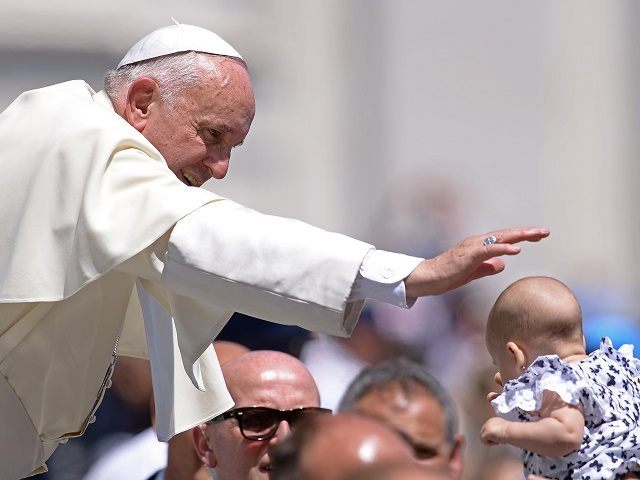ROME — Pope Francis has written a letter to Europe, laying out his “dream” for the continent’s future that includes the elimination of legalized abortion.
“To Europe, then, I would like to say: you, who for centuries have been a seedbed of high ideals and now seem to be losing your élan, do not be content to regard your past as an album of memories,” the pontiff writes in a letter addressed to the Vatican’s Secretary of State, Cardinal Pietro Parolin. The letter is dated October 22, but was only released by the Vatican on Tuesday.
“Europe, find yourself! Rediscover your most deeply-rooted ideals. Be yourself! Do not be afraid of your millenary history, which is a window open to the future more than the past,” the pope urges in a celebration of the 50th anniversary of the establishment of diplomatic relations between the Holy See and the European Union.
“Do not be afraid of that thirst of yours for truth, which, from the days of ancient Greece, has spread throughout the world and brought to light the deepest questions of every human being,” he continues. “Do not be afraid of the thirst for justice that developed from Roman law and in time became respect for all human beings and their rights.”
“Do not be afraid of your thirst for eternity, enriched by the encounter with the Judeo-Christian tradition reflected in your patrimony of faith, art and culture,” he adds.
The pope goes on to sketch his “dream” for the future of the old continent, which he once described as a “grandmother” who is “no longer fertile and vibrant.”
“I dream, then, of a Europe that is a friend to each and all,” he writes. “A land respectful of everyone’s dignity, in which each person is appreciated for his or her intrinsic worth and not viewed purely from an economic standpoint or as a mere consumer. A land that protects life at every stage, from the time it arises unseen in the womb until its natural end, since no human being is the master of life, either his or her own life or the lives of others.”
I dream of a land “that promotes work as a privileged means of personal growth and the pursuit of the common good, creating employment opportunities particularly for the young,” he continues. “Being a friend to others entails providing for their education and cultural development. It entails protecting the weakest and most vulnerable, especially the elderly, the sick in need of costly care, and those with disabilities.”
“Being a friend to others entails defending their rights, but also reminding them of their duties,” he declares. “It means acknowledging that everyone is called to offer his or her own contribution to society, for none of us is a world apart, and we cannot demand respect for ourselves without showing respect for others.”
The uniqueness of Europe, Francis insists, “rests above all on its conception of the human being and of reality, on its capacity for initiative and on its spirit of practical solidarity.”
And thus, “as many in Europe look to its future with uncertainty, others look to Europe with hope, convinced that it still has something to offer to the world and to humanity,” he states.
“Europe is a genuine family of peoples, all different yet linked by a common history and destiny,” the pope declares, while urging the nations that compose it to remain united.
“A divided Europe, made up of insular and independent realities, will soon prove incapable of facing the challenges of the future,” insists, while “a Europe that is a united and fraternal community will be able to value diversity and acknowledge the part that each has to play in confronting the problems that lie ahead.”
“I dream of a Europe that is inclusive and generous,” he writes. “A welcoming and hospitable place in which charity, the highest Christian virtue, overcomes every form of indifference and selfishness.”
Francis also speaks of a Europe “ready and willing, through international cooperation, to offer generous assistance to other continents,” of which he underscores Africa, “where there is a need to resolve ongoing conflicts and to pursue a sustainable human development.”
Regarding the contemporary “uneasiness and concern about migrants,” the pope asserts that only “a Europe that is a supportive community can meet the present challenge in a productive way.”
“It is clear that a proper acceptance of migrants must not only assist those newly arrived, who are often fleeing conflict, hunger or natural disasters, but must also work for their integration, enabling them to learn, respect and assimilate the culture and traditions of the nations that welcome them,” he states.
“I dream of a Europe marked by a healthy secularism, where God and Caesar remain distinct but not opposed,” he continues. “A land open to transcendence, where believers are free to profess their faith in public and to put forward their own point of view in society.”
While criticizing “a certain laicism closed to others and especially to God,” Francis says “it is evident that a culture or political system that lacks openness to transcendence proves insufficiently respectful of the human person.”
The pontiff concludes by expressing his “certainty that Europe still has much to offer to the world.”
“My words are meant solely to be a personal contribution to the growing call for reflection on the continent’s future,” he states.

COMMENTS
Please let us know if you're having issues with commenting.